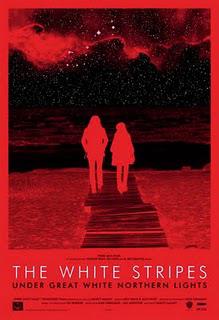 I don't know that a weak documentary could be made about the White Stripes. It Might Get Loud, which boasted the presence of a certifiable guitar god and an alt.icon, was never more alive than when Jack White was front and center; heck, even Jimmy Page and The Edge seemed enthralled by his artistic approach, philosophy and passion. Under Great White Northern Lights, filmed during the band's first-ever Canadian tour in 2007, is as scattershot as any film focusing on such oddball characters as Jack and Meg White must be, but it is also a poignant document of what one critic called "the most fake band in the world and the most real band in the world," a pullquote Jack references with a mixture of bitterness and acquiescence.
I don't know that a weak documentary could be made about the White Stripes. It Might Get Loud, which boasted the presence of a certifiable guitar god and an alt.icon, was never more alive than when Jack White was front and center; heck, even Jimmy Page and The Edge seemed enthralled by his artistic approach, philosophy and passion. Under Great White Northern Lights, filmed during the band's first-ever Canadian tour in 2007, is as scattershot as any film focusing on such oddball characters as Jack and Meg White must be, but it is also a poignant document of what one critic called "the most fake band in the world and the most real band in the world," a pullquote Jack references with a mixture of bitterness and acquiescence.The performances it captures are incendiary, energetic, and often hilarious. The film opens on the goofy debut of the Stripes in Canada with a self-explanatory "one-note show" that leaves fans hilariously chanting "One more note!" after the pair bangs out a chord and disappears with all the frenzy with which they arrived. For the rest of the film, they behave like a band struggling to get noticed, not multiple-Grammy winners and platinum sellers. By night, they are stars, filling theaters with fans who have been waiting years to see them. By day, however, they play town squares, classrooms, rec center, bowling alleys, a boat that makes the Orca look like a yacht, and anywhere where they can squeeze in a guitar, some drums and a microphone or two. These free side shows make the conquering schedule of every province and every territory more intimate and friendly than domineering, a means of making up for lost time and changing up the usual touring mode.
Emmett Malloy directs the film to the band's quirky white-black-red aesthetic, slipping between black-and-white film and color stock saturated in the red of the duo's gear and garb. A few stylistic flourishes fit his montage assembly of gigs, the visuals slurring through a jump cut as the songs skip around by both editing and the band's lightning-quick transitions, and he wryly captures the drives around Canada with good-natured banality and idyll. But the chilly calm of even the most remote province seems to shatter when the White Stripes arrive and set up in the nearest odd spot.
As they ride around with pleasant chauffeurs who don't always understand who these cats are, a portrait emerges of the band that both confirms and subverts their image. The love of traditional music bridges their focus on Delta blues with the music of an Inuit community center they visit. Jack likes to push the idea that he and Meg are siblings rather than a divorced couple, but damned if they don't behave like brother and sister. They tease each other, jovially bicker but always admire the other. In the film's finest moment (and its last), Jack plays "White Moon" on the piano for Meg, who sits on the stool with him fighting back tears as that high, broken voice of his growls out the lyrics.
That chemistry carries enough sweetness that the film is even more touching now that the White Stripes are, for the time being at least, no more. A few archival clips show the band at their inception, but Malloy wisely sticks to the present, showing the two celebrating their 10th anniversary by trying one last injection of spontaneity into a line of work that all too often feels like just that. Though it neither breaks any rules nor expands any horizons, Under Great White Northern Lights is a funny, touching, revelatory work that probes into one of this fashionably unfashionable outfit and the impact it had on those looking for something different.

